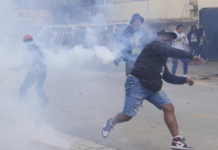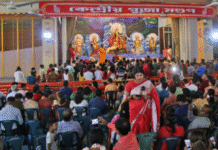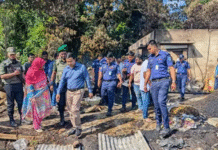
The International Crimes Tribunal-1 on Monday expressed its dissatisfaction as the prosecution failed to comply with its standing order to run the trial uninterrupted in recording testimony of witnesses against war crimes accused Jamaat-e-Islami ameer Motiur Rahman Nizami.
A week ago, the three-member tribunal had asked the jail authorities not to produce Nizami in any other court without its prior permission until further order to continue the war crimes trial uninterrupted as enough time had been wasted by both sides without reasonable ground.
With the conclusion of cross-examination of PW-20 Tahurul Alam Mollah, a Liberation War hero, Justice ATM Fazle Kabir, chairman of the tribunal, asked designated prosecutor Mohammad Ali to produce the next PW.
Instead of producing the PW, the prosecutor felt embarrassed before the tribunal and said: “Please allow us a day’s adjournment as we’re facing some troubles.”
Apparently irked, the tribunal said: “You (prosecutor) better close the chapter if you fail to produce a vital witness against the charge.”
“Henceforth, any additional PW you bring must have a bearing on the charge,” it said.
Raising a question mark on the testimony made by the PW-20 (additional one), the tribunal said, “We didn’t find any uniformity of the evidence with the charge No.5 against accused Nizami as per record.”
The tribunal further said that it had allowed new PW beyond the set PW list, but not allowed pressing new charge.
Earlier, during the cross–examination, defence counsel Mizanul Islam apparently found straying from the facts of the case.
At one stage, the tribunal interrupted the defence counsel and said, “Mr Islam how long you would endure the trouble. You’ve already suffered a lot.”
During the day’s cross-examination, PW-20 Tahurul told the tribunal that after the independence of Bangladesh he had heard from the Imam of the mosque in Iswardi that some 18-20 dead bodies, including his father and maternal uncle, had been removed by the Pakistan occupation army from the nearby coal depot, a killing ground.
“The Iman had also told me that all the victims, who took refuge in the mosque, had been killed after they were dragged out from the mosque,” he added.
A day before, the PW in his deposition told the tribunal that he had seen in his own eyes from a hideout in a nearby bush the grisly killing of his father Moazzem Hossain by sword at a coal depot after dragging him out from a mosque in Iswardi, Pabna on April 17 during the 1971 Liberation War in presence of accused Nizami and his associates.
The Jamaat chief is being tried on charges of involvement in murders and torture of unarmed people along with hatching conspiracy, planning, incitement and complicity to commit genocide and crimes against humanity during the 1971 Liberation War in collaboration with the Pakistan occupation army.
Also the president of Islami Chhatra Sangha (ICS), the student wing of Jamaat-e-Islami in 1971, Nizami faces 16 counts of charges based on 16 separate incidents of crimes against humanity, in which at least 600 unarmed people were killed and 31 women raped during the Liberation War.
On December 11, 2011, the prosecution submitted the formal charge against Nizami before the tribunal.
On January 9, 2012, the tribunal took cognisance of the formal charge against Nizami for facing the trial of crimes against humanity during the country’s Liberation War.
On May 28, 2012, the tribunal indicted the Jamaat ameer for committing the 1971 crimes against humanity.
Nizami, detained in connection with other criminal case, was shown arrested on August 2, 2010, in connection with the war crimes case.
Source: UNB Connect









